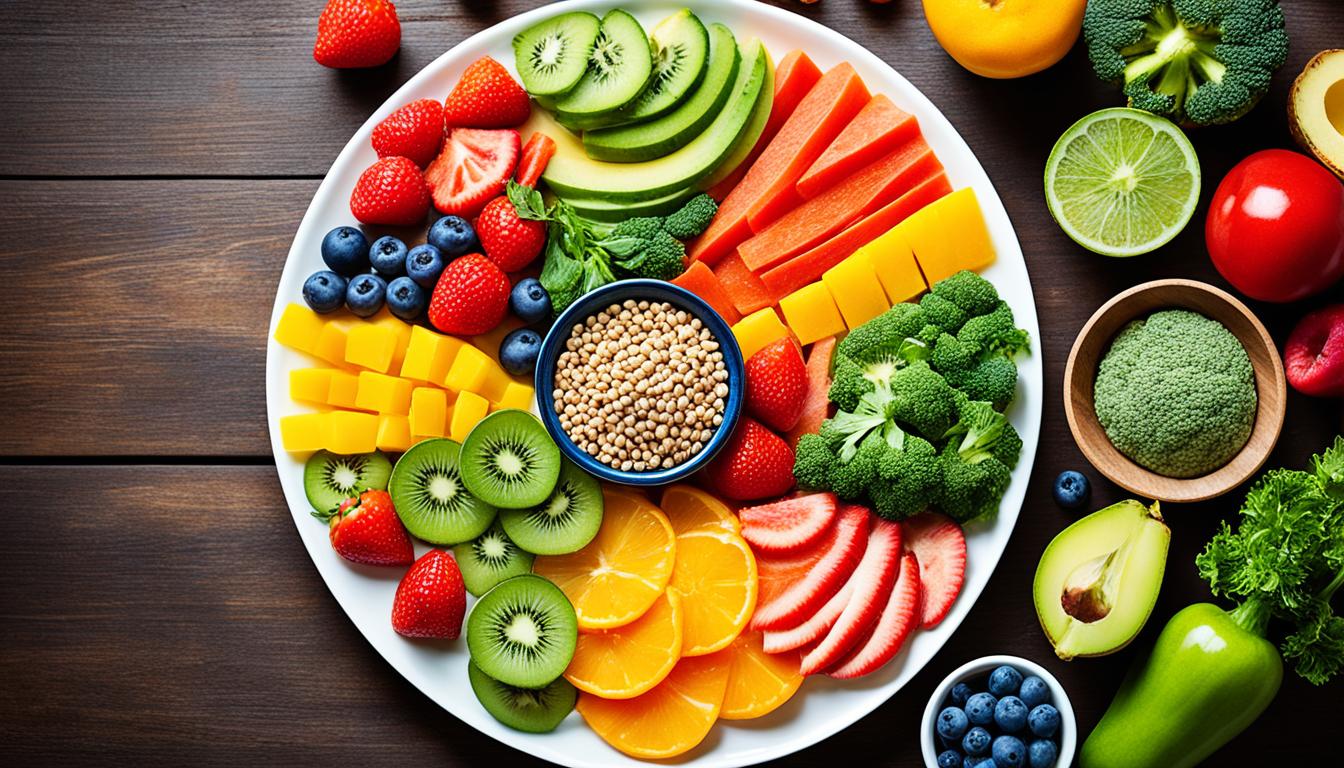Dear reader,
Waking up with achy joints or feeling drained can be demoralizing. My name is Emily. For years, I fought constant inflammation and its tiring symptoms. The cycle of pain and fatigue seemed never-ending. That was until I found out about the anti-inflammatory diet.
This image captures the relief I felt by following a 21-day anti-inflammatory diet. It helped me take back my health, lowering inflammation for a better sense of well-being. Now, I’m excited to share this empowering journey with you. Discover the strength of natural anti-inflammatory foods with me.
Key Takeaways:
- Chronic inflammation can lead to diseases like heart disease, diabetes, and autoimmune issues.
- An anti-inflammatory diet uses nutrient-rich foods and healthy fats to fight inflammation.
- Unhealthy foods, like processed meats and bad fats, can increase inflammation and disease risks.
- People who work in offices can see benefits like better focus, more energy, and help with weight control.
- To start a 21-day anti-inflammatory diet, change your lifestyle. Eat more fruits and veggies, choose good fats and proteins, and cut down on refined carbs and sugar.
What is Inflammation in the Body?
Inflammation is the body’s way to heal wounds and fight off germs. It’s a key part of how our immune system defends us. When we get injured or infected, the body starts an inflammation process. This means releasing white blood cells and chemicals to the spot that’s affected.
Inflammation comes in two main types: acute and chronic. Acute inflammation is quick, helping the body to heal from injuries or infections. It usually shows as swelling, pain, redness, and warmth. These signs tell us that healing is happening.
Acute inflammation happens when our immune system sees something harmful, like a cut or a bug bite. It then sends blood and immune cells there. The cells release chemicals that make the area swell and feel warm. This kind of inflammation is good for us and helps in healing.
Chronic inflammation is different. It’s inflammation that lasts a long time, sometimes without a clear reason. It can happen if the immune system wrongly attacks our own cells. This long-lasting inflammation is linked to diseases like heart disease, diabetes, and some cancers.
While acute inflammation is part of healing, chronic inflammation is not good for us. Knowing the difference helps us manage and reduce long-term inflammation. This can lead to a healthier life.
Inflammation lets the body heal from injuries and fight infections. Acute inflammation is short-term and aids in healing. Chronic inflammation lasts longer and is linked to various diseases.
Why Does Inflammation Occur?
Inflammation is the body’s shield against injuries and germs. It starts when we’re hurt or sick. The immune system sends out chemicals that draw white blood cells to where they’re needed. These cells help get rid of invaders and fix the damaged area.
Inflammation is complex, involving many cells and signals. While it’s a necessary reaction, when it goes on too long it can harm us. Chronic inflammation can damage our tissues and is behind many diseases.
How Are Corporate Employees Prone to Inflammation?
Corporate workers often face stress and a lifestyle that keeps them sitting for hours. These issues can lead to diseases caused by long-term inflammation. This risk affects their health over time.
Work stress is widespread in the corporate sector, causing several health problems. It makes the body constantly react to stress, releasing hormones like cortisol. This constant stress response can harm the immune system, leading to chronic inflammation.
“Chronic inflammation not only undermines the overall well-being of employees but also puts them at a higher risk of developing serious conditions like type 2 diabetes, cardiovascular disease, and even depression.”
The sedentary lifestyle of many corporate workers also increases inflammation risk. Long hours of sitting can raise levels of certain fats and proteins in the body. These contribute to inflammation.
To fight this, corporate workers should focus on their health. Adding exercise, stress-busting activities, and an anti-inflammatory diet to their lives can lower disease risk. This change is vital for their long-term health.
What is an Anti-Inflammatory Diet?
An anti-inflammatory diet helps reduce inflammation by avoiding certain foods. It focuses on eating nutrient-rich foods, healthy fats, and whole grains. It stays away from processed foods, saturated fats, and added sugars.
This diet offers many health benefits. Eating fruits and veggies provides vitamins and antioxidants that battle inflammation. Healthy fats in avocados and fish fight inflammation too.
This eating plan is full of variety and not about restriction. It includes tasty, healthful food choices. It’s about choosing foods that boost health and cut down on inflammation.
Whole grains add to the diet’s benefits by offering fiber. Avoiding processed items and sugars lessens inflammation-causing substances.
Adopting this diet improves health in several ways. It lowers the risk of diseases linked to inflammation like heart disease. It also benefits the brain, digestion, and helps maintain a healthy weight.
Foods to Include in an Anti-Inflammatory Diet
This diet includes foods known to lessen inflammation. Here’s what you should eat:
- Dark leafy greens: Spinach, kale, and Swiss chard are loaded with nutrients that fight inflammation.
- Fatty fish: Salmon, mackerel, and sardines are full of omega-3s, known for their anti-inflammatory effects.
- Foods rich in vitamin C: Citrus fruits, strawberries, bell peppers, and broccoli help ward off inflammation.
- Whole grains: Quinoa, brown rice, and oats, which are great for gut health and reducing inflammation.
- Seeds and nuts: Chia seeds, flaxseeds, walnuts, and almonds contain fats and antioxidants that battle inflammation.
Adding these foods to your diet helps your body heal and reduce inflammation.
Anti-Inflammatory Diet Pyramid
| Food Group | Servings per Day |
|---|---|
| Vegetables | 5-9 servings |
| Fruits | 2-4 servings |
| Whole grains | 3-5 servings |
| Healthy fats | 2-3 servings |
| Proteins | 2-3 servings |
| Herbs and spices | 2-3 servings |
| Water | 8 glasses or more |
This pyramid is a handy guide to eating anti-inflammatory foods daily.
What Foods Are Anti-Inflammatory?
Eating anti-inflammatory foods is key to reducing inflammation. These foods are full of antioxidants, vitamins, and minerals that combat inflammation. Let’s look at some vital foods for your anti-inflammatory diet:
1. Dark Leafy Greens
Spinach, kale, and Swiss chard are full of vitamins, minerals, and antioxidants. They’re also high in fiber, which supports a healthy gut and fights inflammation. You can add these greens to salads, blend them into smoothies, or sauté them for a side dish.
2. Fatty Fish
Fatty fish like salmon, mackerel, and sardines are rich in omega-3 fatty acids. These fats are known to lower inflammation and improve heart health. Enjoy these fish grilled or baked in your main meals or add them to salads and sandwiches.
3. Foods Rich in Vitamin C
Vitamin C is a strong antioxidant that defends against oxidative stress and inflammation. Oranges, grapefruits, lemons, bell peppers, strawberries, and kiwi are great vitamin C sources. Add these fruits and veggies to your diet for a boost to your immune system and to fight inflammation.
4. Whole Grains
Quinoa, brown rice, and oats are great sources of fiber, vitamins, and minerals. They’re better than refined grains because they help control blood sugar and reduce inflammation. Use whole grains as a base or side in your meals.
5. Seeds and Nuts
Seeds and nuts, including flaxseeds, chia seeds, walnuts, and almonds, are filled with healthy fats, fiber, and antioxidants. These elements work together to reduce inflammation and keep your heart healthy. You can add seeds and nuts to salads, yogurt, or have them as a snack.
To lower inflammation and boost wellness, include these foods in your diet. Always check with a health expert or dietitian before changing your diet significantly.
What Are Inflammatory Foods?
Inflammatory foods lead to chronic inflammation and raise disease risks. They are often full of processed meats, bad fats, refined carbs, sugary drinks, and red meat. Knowing how these foods affect our health helps us choose better for our diet and well-being.
The Effects of Processed Meats
Processed meats, like sausages and deli meats, cause more inflammation. They have a lot of sodium, preservatives, and additives. These can make the immune system react and increase inflammation.
The Dangers of Unhealthy Fats
Unhealthy fats are in fried foods and snacks. They lead to weight gain and more inflammation. Eating healthier fats, like those in avocados and nuts, can lower inflammation.
The Impact of Refined Carbs
Refined carbs, such as white bread and pastries, turn into sugar fast. Eating too much can cause blood sugar spikes and inflammation. Choose whole grains and fibrous foods instead to help lower inflammation.
The Dangers of Sugar-Sweetened Beverages
Sugar-sweetened drinks like sodas increase inflammation. They cause weight gain and insulin resistance. Drinking water or herbal tea instead is a healthier choice.
The Role of Red Meat
Red meat has a lot of saturated fats and can cause inflammation if eaten too much. But, lean red meat can be okay in small amounts. To reduce inflammation, pick lean cuts and mix up your protein sources.
We need to understand which foods may cause inflammation. This helps us eat less of them and pick healthier options. Eating a diet with lots of anti-inflammatory foods, like fruits, vegetables, whole grains, and fish, can decrease inflammation and keep us healthy.
Anti-Inflammatory Diet Benefits for Corporate Employees
An anti-inflammatory diet helps corporate employees in many ways. It boosts concentration, work productivity, energy levels, and aids in weight management. Eating nutrient-rich foods lowers inflammation. This leads to better health and easier daily tasks and workplace success.
Eating foods high in antioxidants, vitamins, and minerals boosts brain health. Foods like dark leafy greens, berries, and fatty fish are great choices. They fight oxidative stress and inflammation. This improves mental clarity and focus all day.
An anti-inflammatory diet also raises energy levels in corporate employees. Whole grains, seeds, and nuts give a steady energy supply. This helps avoid the energy dips that sugary snacks cause. With nutritious foods, employees avoid feeling tired and stay productive.
Managing weight is easier with an anti-inflammatory diet. Choosing nutrient-rich foods helps maintain a healthy weight. This reduces inflammation risks and chronic diseases. Being at a healthy weight improves overall well-being.
Although an anti-inflammatory diet is beneficial, it’s not the sole solution. For best results, combine it with regular exercise, stress management, and good sleep. This approach enhances health and well-being.
An anti-inflammatory diet improves concentration, productivity, energy, and weight control for corporate employees. Eating whole foods and reducing body inflammation promotes a vibrant lifestyle. This helps employees excel professionally and personally.
The Impact of an Anti-Inflammatory Diet on Corporate Employees
Choosing an anti-inflammatory diet benefits corporate employees greatly. It provides essential nutrients for optimal performance. This leads to improved well-being and work success. Here are benefits of this diet:
- Improved concentration and focus
- Enhanced work productivity
- Steady and sustained energy levels throughout the day
- Effective weight management
- Reduced risk of chronic diseases associated with inflammation
- Increased overall well-being and vitality
By eating right and lowering inflammation, corporate employees can succeed and feel fulfilled at work.
Stay Focused, Energized, and Healthy with an Anti-Inflammatory Diet
An anti-inflammatory diet helps corporate employees stay sharp, energized, and productive. Including anti-inflammatory foods like greens, berries, fish, and grains is key. This forms a success foundation at work and in life.
How Can I Get Started on the 21-Day Anti-Inflammatory Diet?
Starting the 21-day anti-inflammatory diet means making some big lifestyle changes. Incorporating these changes into your life can help lower inflammation and boost your health.
Making Lifestyle Changes
Begin by cutting down on processed foods. These foods are high in unhealthy fats, sugars, and preservatives, which can cause inflammation. Reducing these from your diet can greatly lessen inflammation in your body.
To fight inflammation even more, eat more fruits and vegetables. They are full of vitamins, minerals, and antioxidants that fight inflammation and strengthen the immune system. Try to add a variety of colorful fruits and veggies to your meals for different nutrients.
It’s also essential to pick healthy fats and lean proteins. Choose avocados, olive oil, nuts, and seeds for their anti-inflammatory effects. Include lean proteins like fish, chicken, and legumes in your diet, but avoid saturated fats from red meat.
Reducing Refined Carbohydrates and Sugar
Cutting back on refined carbs and sugar helps maximize the diet’s benefits. Refined carbs like white bread and pastries raise blood sugar and increase inflammation. Swap them for whole grains such as quinoa, brown rice, and whole wheat bread to help control inflammation.
Try to eat less sugar too. Sugary drinks, desserts, and snacks can cause long-term inflammation. For a sweet fix, use fruits or healthier sweeteners like stevia or honey, but only in small amounts.
Following these steps and sticking to the 21-day anti-inflammatory diet can decrease inflammation, boost energy, aid in weight management, and enhance overall health.
Top 20 Anti-Inflammatory Foods
Eating the right foods is crucial to fight chronic inflammation. The top 20 anti-inflammatory foods are full of nutrients, antioxidants, and compounds. They can naturally fight inflammation. These foods include:
- Berries: Blueberries, strawberries, and raspberries have antioxidants. They fight inflammation and protect from oxidative stress.
- Fatty Fish: Salmon, mackerel, and sardines have omega-3 fatty acids. These fats are strong against inflammation.
- Leafy Greens: Spinach, kale, and Swiss chard have vitamins, minerals, and antioxidants. They help lower inflammation and boost health.
- Turmeric: This spice has curcumin, known for fighting inflammation. Adding turmeric to food can ease inflammation.
- Avocados: These fruits are full of good fats and antioxidants. They can help fight inflammation.
By adding these foods to your meals, you get to eat tasty dishes. At the same time, you enjoy their benefits against inflammation. Let’s dive deeper into each food:
Berries
Berries like blueberries, strawberries, and raspberries are tasty. They have antioxidants that fight inflammation. These fruits have flavonoids which reduce inflammation in the body.
Fatty Fish
Fatty fish such as salmon, mackerel, and sardines are great omega-3 sources. These fats are great at reducing inflammation. They also lower the risk of heart disease and arthritis.
Leafy Greens
Spinach, kale, and Swiss chard are full of important vitamins, minerals, and antioxidants. They have carotenoids, vitamin C, and K. These help in fighting inflammation and improving health.
Turmeric
Turmeric is famous for its yellow color and health benefits. It has curcumin. This compound is very effective against inflammation. Adding turmeric to your diet can ease inflammation-related symptoms.
Avocados
Avocados are extremely nutritious. They have monounsaturated fats that are good for fighting inflammation. They also offer antioxidants and fiber. This makes them perfect for anti-inflammatory diets.
| Food | Benefits |
|---|---|
| Berries | Rich in antioxidants and flavonoids that reduce inflammation. |
| Fatty Fish | High in omega-3 fatty acids that lower inflammation and reduce the risk of chronic diseases. |
| Leafy Greens | Packed with vitamins, minerals, and antioxidants that fight inflammation and support overall health. |
| Turmeric | Contains curcumin, a compound with powerful anti-inflammatory properties. |
| Avocados | Rich in monounsaturated fats and antioxidants that combat inflammation. |
These top 20 anti-inflammatory foods are not just good for fighting inflammation. They also offer many other health benefits. By adding them to your diet, you can improve your overall well-being. So, start enjoying these tasty and healthy foods in your meals today!
Conclusion
The 21-day anti-inflammatory diet aims to cut down inflammation and boost health. It uses a mix of foods known to fight inflammation. Enjoying these foods every day can help you feel better overall.
This diet not only raises your energy but also sharpens your focus. Eating foods that fight inflammation helps you feel lively and stay on task.
Plus, sticking to this diet can guard against long-term health issues. It lowers the risk of diseases linked to inflammation, like heart disease, diabetes, and autoimmune diseases.
But, it’s wise to talk to a health expert before starting any new diet. They can make sure it’s the right fit for your health and needs.





